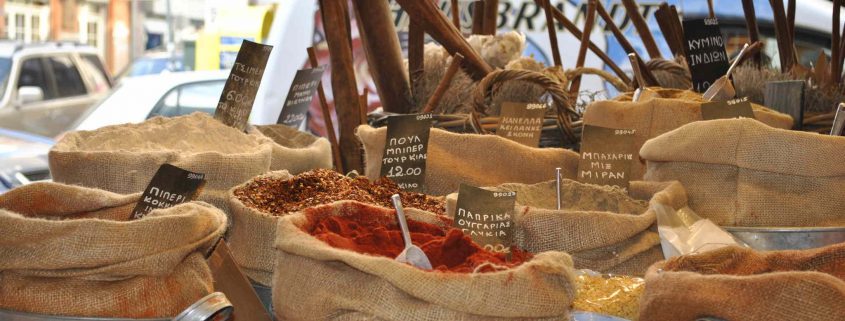Greek Herbs And Spices are natural products, and have been used since Ancient times in Greece. The variety of herbs and spices in the Greek countryside gave the Ancient Greeks the ingredients to flavor their food, as well as the possibility to cure people. This reflected in the famous quote of Hippocrates (c. 460 – c. 370 BC), physician and the father of medicine: “Let food be your medicine, and medicine be your food”.
The rich soil in Greece, the presence of mountains and sea as well as the warm climate, are a perfect combination for the herbs to grow and produce an excellent quality. Moreover, chefs from all across Europe prefer Greece’s naturally grown herbs over others. (for example: chamomile, mountain tea, sage, basil, thyme and oregano).
Common herbs and spices in the Greek Kitchen
The Greek kitchen is all about enhancing the natural flavors of the products and generally, food in Greece is not spicy. If you want to add them to your kitchen cupboard, here you find a useful vocabulary list.
As you can see, we have two categories here: herbs and spices. The difference between spices and herbs is related to the part of the plant they are obtained from. Herbs are taken from the green part with the leaves. Spices come from other parts of the plant such as the root, stem, bulb, bark or seeds.
| Herbs | βότανα | Spices | Μπαχαρικά |
| mint | ο δυόσμος/ η μέντα | cinnamon | η κανέλα |
| oregano | η ρίγανη | pepper | το πιπέρι |
| sage | το φασκόμηλο | cloves | το γαρίφαλο |
| basil | ο βασιλικός | nutmeg | το μοσχοκάρυδο |
| thyme | το θυμάρι | cumin | το κύμινο |
| rosemary | το δενδρολίβανο | paprika | η πάπρικα |
| dill | το άνηθο | saffron | ο κρόκος |
| fennel | το μάραθο | sesame | το σουσάμι |
| celeriac | η σελινόριζα | mastiha | η μαστίχα |
| parsley | ο μαϊντανός | ||
| coriander | το κολίανδρο | ||
| bay leaves | τα φύλλα δάφνης | ||
| marjoram | η μαντζουράνα |
Some of examples in the Greek kitchen are for example: stew with cinnamon, zucchini balls with fennel, meat balls with cumin and sweets with mastiha. Click here to read more about mastiha (only growing on the island of Chios) and saffron (growing in North Greece).
If you want to have an idea of what’s going on in a Greek kitchen, then you can watch the excellent Greek movie “A touch of spice”, “Πολίτικη κουζίνα” (Politki kouzina). Have a look at the trailer —>>
Herbal Tea
In every season there are specific herbs and spices which provide natural protection against various infections. During winter, tea is one of those. Faskomilo, mountain tea, mint, chamomile and saffron are the herbs that can be found in many Greek houses. These herbs are also the ideal ingredients for a healthy herbal tea on a cold winter evening.
If you prefer your tea to be sweet, then you can add Greek honey. Greeks rarely use sugar for their tea.
Where to buy your herbs and spices?
Many herbs can be bought freshly on the weekly markets in Athens or other Greek cities. If you cannot make it to the market, also supermarkets sell the most common herbs, both fresh and dried. In case you prefer dried herbs and spices, the place to be (when in Athens) is Evripidou street (side street of Athinas, between Omonia and Monasteraki station). In this small street in the center of Athens, you will find anything you need. Have a look at the small video where the owner of the shop explains us which herbs she sells.
Have fun with your shopping and cooking!
++++++++++++++++++++++++
In the mood to learn more about Greece, with interesting texts in Greek and English + Audio?
Then the eBook “Greece; The Ultimate Listening and Reading Comprehension eBook is exactly what you are looking for.









